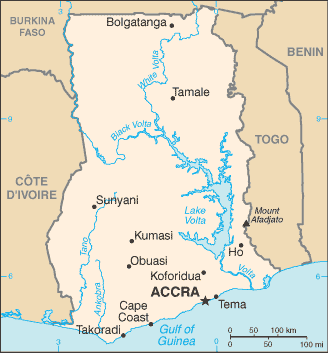Ghana

The Republic of Ghana has an estimated population of 24.3 million (UN, 2010). The capital is Accra. Ghana has an area of 238,533 sq km (92,098 sq miles). The main languages are English, and other African Languages including Akan, and Ewe.
Ghana became independent in 1957 from the British and became the first Sub-Saharan country to gain independence from a colonial power. After long and repeated coups, the country gained stability in 1992 with the approval of new constitution and the restoration of the multiparty politics under Jerry Rawlings. Thanks to its political and economic reform, Ghana is viewed as a model country in the Sub-Sahara region. Also, Ghana is an important contributor to the United Nations peacekeeping troops in the Ivory Coast, Sierra Leone, and DRC.
The Ghanaian constitution grants equal rights to men and women. However, discrimination and inequality against women still continue in the Ghanaian society. Violence against women such as domestic violence and female genital mutilation is widespread in the country. It is estimated that 15 to 30 percent of girls and women are still circumcised in northern Ghana. According to UN WOMEN report “Progress of the World’s Women: In Pursuit of Justice”, more than one-third of Ghanaians still believe it is justifiable for a man to beat his wife.
- Ghana ratified the Protocol to the African Charter on Human and Peoples' Rights on the Rights of Women in Africa (The Maputo Protocol) on the 13th of June 2007.
- The Convention on the Elimination of All Forms of Discrimination against Women (CEDAW) was ratified by Ghana on the 2nd of January 1986.
- Ghana has not yet adopted a National Action Plan on United Nations Security Council Resolution 1325 (UNSCR 1325).
- There are no current or former UN peacekeeping mandates in Ghana.
